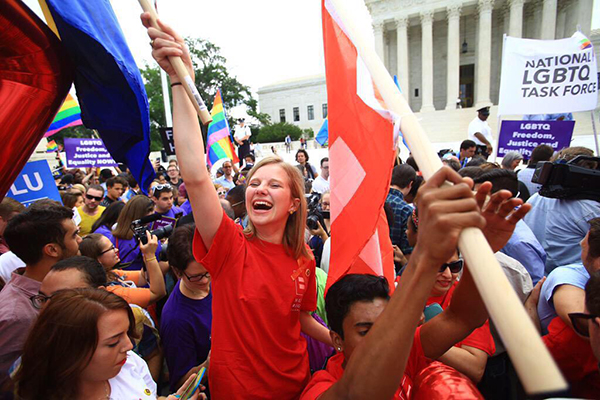This summer, liberal arts students took to professional settings with internships that helped sharpen their skills and develop their roles as employees.
Below, read about three students who interned in a variety of settings, from nonprofit organizations, to innovative local companies, to reputable news organizations.
Madeleine Toups
Major: Government and Liberal Arts Honors senior
Hometown: Spring, Texas
Internship: Human Rights Campaign, Finance Intern, Washington, D.C.
What was a typical day or week like for you at your internship?
Most of my work involved finance and accounting details. I learned a great deal about the specifics of non-profit finance through the yearly audit process, which I took part in.
In addition, I did the weekly check runs, which involved collecting check requests, confirming their accuracy, processing the requests, cutting the checks, acquiring the appropriate signatures and mailing/delivering the checks.
I also had various projects, including a new reimbursement policy for volunteers, tracking and organizing Pride event money from across the country and depositing checks from new members.
In addition to this, all of the HRC interns had “Brown Bag” meetings about once or twice a week. HRC would bring in a panel, specialist or HRC employee (as well as food) to discuss an issue affecting the LGBTQ community. I learned a great deal about HIV/AIDS, the Voting Rights Act, the Corporate Equality Index and discrimination against Transgender people.
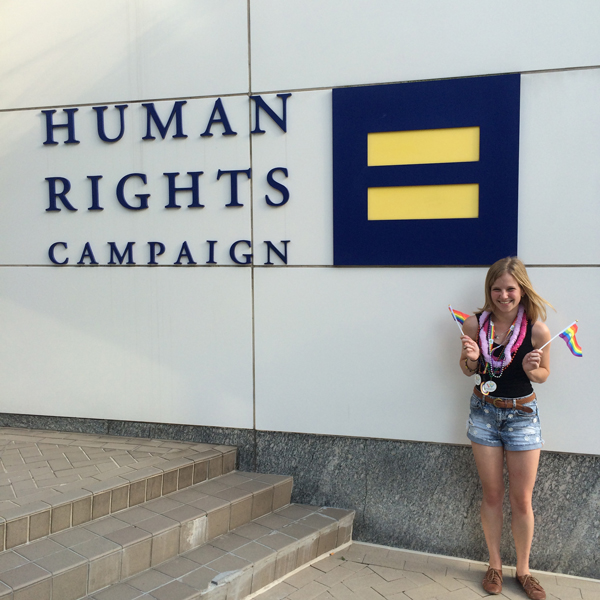
Do any significant moments this summer stand out?
The biggest moment of my summer came on June 26, when Obergefell v. Hodges legalized same-sex marriage across the country. I stood with all of the Human Rights Campaign outside of the Supreme Court to hear the news and it was phenomenal. I could feel the love all around me. People were crying, hugging, laughing and celebrating.
I met so many loving couples that day, including two women who had been partners for 14 years from Austin. They drove up on Thursday when the decision wasn’t announced, so they could be there on Friday for when it came down. They had so much joy in their eyes.
What did your experience this summer teach you?
This summer showed me why equality is so important. It’s hard to describe the overwhelming feeling of love on those steps that day, but it is something that I will never lose. There is still a long way to go for full LGBTQ equality, but I learned why and how to keep working for it.
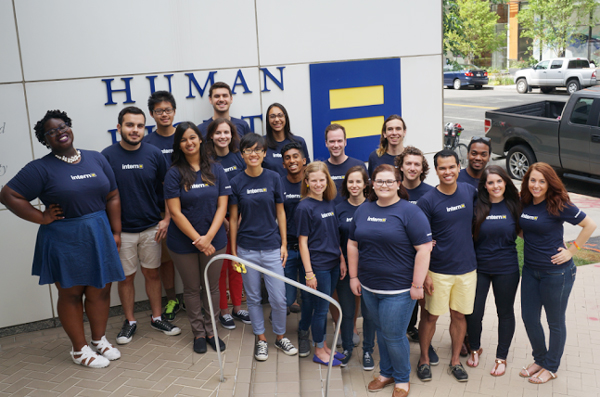
Did this internship impact your long-term plans?
I have always been interested in progressive issues and politics and this internship solidified my resolve. My long-term plans had previously involved graduate studies in the liberal arts field, but my work with the Human Rights Campaign showed me the interest I have in public policy and public health. These are two ways I can best assist the LGBTQ community, as well as other marginalized communities.
I am now looking at graduate studies in both of these fields, so that I can have a better, more positive impact on legislation and health-related work.
How did your experience as a liberal arts student help you this summer?
The UT College of Liberal Arts prepared me well for the position I took with HRC. Though I was in the finance department, I still had a great deal to do with writing and researching issues related to the Human Rights Campaign, much like my liberal arts classes taught me.
In addition, the knowledge I learned from classes related to the Supreme Court became a huge assistance this summer.
Is there anything else about your internship this summer that you want to share?
Being at HRC, I was surrounded by a more diverse group of people than I have ever experience in Texas. I learned about the importance of pronouns and gender identification, and how this is wholly different from sexuality and attraction.
I also heard terrible stories of the discrimination faced by some of the most wonderful and positive people I have had the pleasure of meeting. HRC showed me how diverse our country is and the work we still have left to accomplish.
Wynne Davis
Major: International Relations & Global Studies and International Security & European Studies senior
Hometown: Houston, Texas
Internship: The Dallas Morning News, Interactive Storytelling Producer, Dallas, Texas
What’s a typical day for you like at your internship?
As an interactive storyteller, I get to code and create interactive digital presentations for really interesting stories. HTML and CSS are my go-to languages, but I’ve also gotten to learn some new tools and tricks and add those into the mix.
There’s not really a typical schedule for the interactive department, because we’re all always working on something and often times multiple pieces. The design starts way before the stories are done and involves talking to the reporters, photographers, graphic artists and anyone else involved in the story. While the creativity and freedom that you’re given as an intern in this department are great, it’s important to make sure to check in with these people, so you can represent the story correctly.
Mornings usually start at 9 a.m. and begin with a cup of coffee and some light email reading. Then you’ll code and probably go to some meetings and talk with people for the project you’re working on. When lunchtime comes around, go with your team or the other interns and take advantage of the opportunity to learn from so many people who are different from yourself.
Speaking of lunches, each week there is a brownbag session with different reporters and editors from the paper. These are amazing events that you don’t want to miss out on. My favorite sessions this summer were storytelling with Dave Lieber and our last brown bag where we discussed journalism ethics with Selwyn Crawford and Bruce Tomaso.
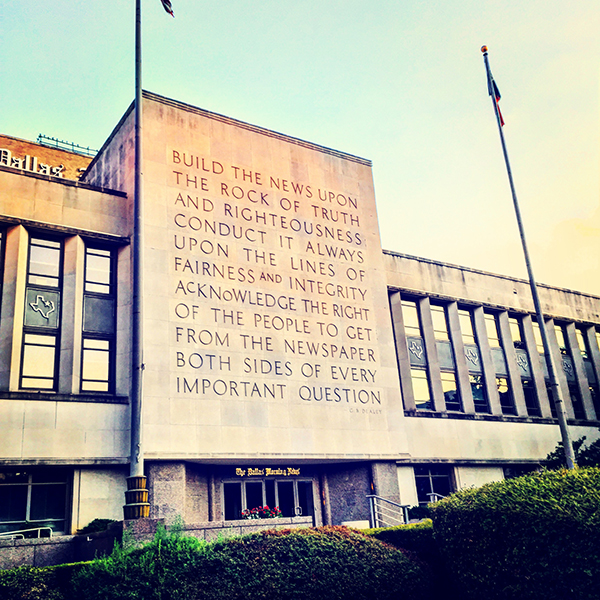
Do any significant experiences from this summer stand out to you?
My team was awesome. I was the only woman on it, and while that can be daunting in theory, I didn’t have any problems and fully enjoyed working with everyone. Being a part of a real news team and working together and being able to ask questions was amazing, and one of my favorite things about this program.
What has your internship taught you?
You don’t have to be a journalism major to be a journalist, and you don’t have to be an English major either. Studying something other than journalism gives you strengths and skills too. You’re more specialized and that’s helpful if you want to cover say, politics for a newspaper. Also, coding gets to so many places and you really can do so much with it, so learning a few basic languages is worth it.
Did this internship impact your long-term plans?
Without a doubt. Before working this internship I’d really only considered typical reporting—meaning writing stories, or digging through data to then also write the stories.
With both of those tracks in mind, I can’t say my mind was in a digital mindset about where the industry was going. Of course I know that digital is what’s going to survive, but I wasn’t fully in that mindset yet.
This internship gave me the opportunity to produce work that was only seen on digital platforms, but also showed me that there’s more to just writing stories that I enjoy about the industry. Wherever I end up after graduation, I know I want to incorporate writing into my job, but if my primary job was creating interactive design, I would still really enjoy it.
The Dallas Morning News is a competitive paper and the internships are not easy to come by. However, it really is a life-changing experience. Before I spent my summer in Dallas, I wasn’t really happy with what I was doing and I didn’t really know how to change it. My job was great and the people were even better. I know what kind of environment I want to work in, the kind of job I want and what skills I want to learn next. I would recommend anyone who’s looking for an amazing journalism internship to check out this program.
Drew Harmon
Major: Economics senior
Hometown: New Boston, Texas
Internship: Alamo Drafthouse Cinemas, Operations Analyst Intern, Austin, Texas
How did you land your internship?
The application process for me was unconventional to say the least…I have been an avid fan of the company for years, and I followed their “Drafthouse Cinephile” Facebook page for a long time.
One day, I was talking with a friend and she explained that I should begin looking into an internship so that I won’t graduate with no professional experience. When thinking about companies I would like to work for, the Drafthouse was the obvious choice for me. Sure, I could’ve gone after a typical economic internship for a financial firm, but that’s boring to me. I wanted to go outside of the box and work for a company I loved, and dive into things I haven’t seen before.
So I reached on Facebook to a guy that works at the main office and asked if they could add on a financial intern for the spring 2015 semester. A few days later I got the green light and the rest was history! Which was pretty cool, because the company had never taken on a financial intern before. It was a learning experience on both sides.
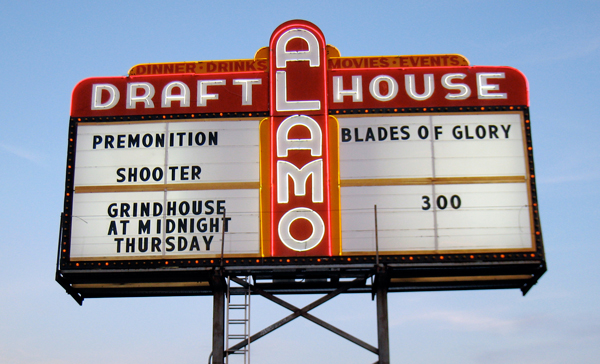
What was a typical day or week at your internship like?
A typical week for me is pretty hard to describe, because I sort of went in week-to-week and worked based on what needed to be done. It’s a rather new company, so there is definitely not a set routine that everyone works toward. Everyone just works on things that need to be done.
The things that I did a lot of include: writing and configuring emails for the Victory rewards program, analyzing the Signature Programming documents every week, sitting in on various meetings and working on different projects I had in the air (a box office cost analysis project, genre analysis project, market share project, food cost project, etc.).
Do any significant moments from your internship stand out to you?
Many. Every single day I had the opportunity to work with the nicest, most challenging people I’ve ever had the pleasure of knowing. They pushed me to keep doing better, be independent and truly took my opinions seriously.
One guy in particular was really hard on me with a certain project I was working on. Every single week I had to hear about every detail that I messed up on and it started to get to me. I never gave up and I just kept fixing my mistakes and made sure that I never made the same mistake twice. After I finally got everything right, I stopped getting emails from him about mistakes and instead I received emails of praise for how great everything looked. I realized that he wasn’t getting on to me or picking at me, he was pushing me to do the best job I could. I learned a lot of patience through that experience.
What did your experience this summer teach you?
As I just mentioned it taught me patience, it also taught me how to interact with coworkers in an office situation, to incorporate ideas from different fields into other fields and that work can be very rewarding.
How did your experience as a liberal arts student help you?
Having the liberal arts background made this internship much more interesting. Thinking outside of the box is what I do best thanks to liberal arts, so when big problems with not so obvious answers arose, I was there to offer up solutions that people might not have thought of.
Did this internship impact your long-term plans?
Unfortunately, I was not offered a permanent position upon ending the summer internship session, so it’s on to the next chapter now. But one piece of advice I can give to someone who’s thinking about interning is this: nothing is guaranteed, so never enter a job thinking you’re all set after graduation. Just build up the best rapport you can with your coworkers and make an impression. That’s all you can really do. Do such a good job that they’ll remember you, and hopefully one day they’ll contact you about a position if one opens up.
To learn more about internships as a student in the College of Liberal Arts, visit Liberal Arts Career Services.
